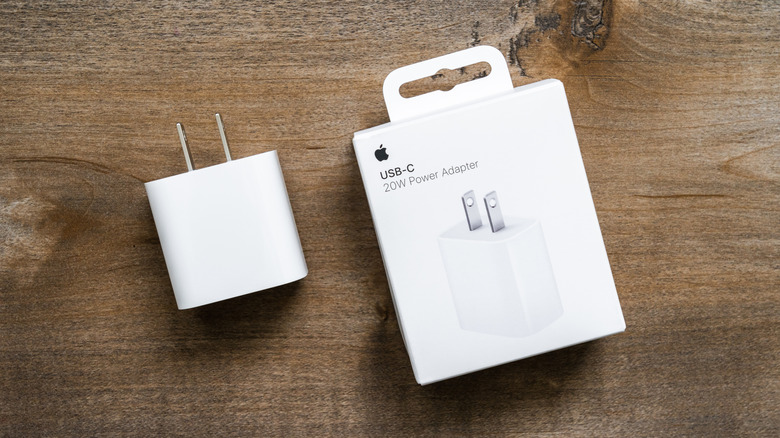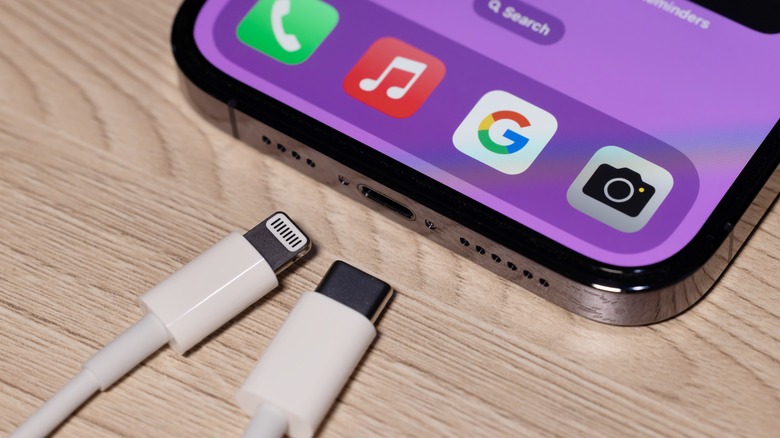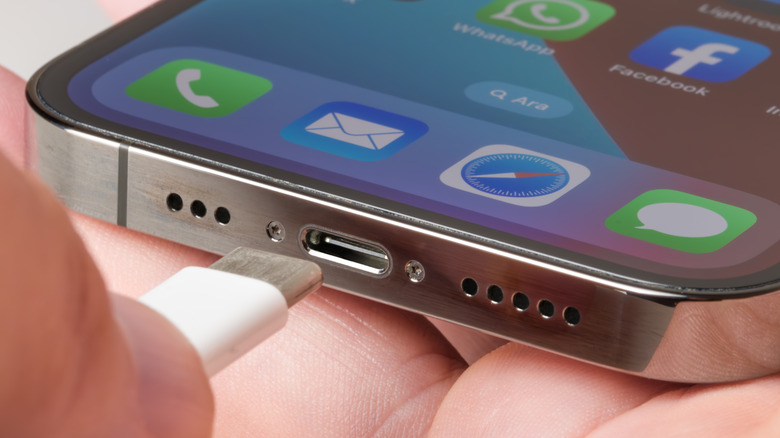How Do You Know If A Charger Is Compatible With An iPhone?
We may receive a commission on purchases made from links.
When it comes to chargers, Apple has always marched to the beat of its own drum. If you're a veteran iPhone user, you've probably been in a situation where you're away from home without a charger and can't find one that's compatible with your iPhone because of Apple's unique charging ports. The iPhone has undergone several changes since its debut in 2007 and its chargers have too. Most recently, Apple was forced to change the chargers iPhone uses to comply with the EU's Common Charger Directive, which requires that all phones sold within the EU use a USB-C charging port.
Instead of designing special charger ports for the EU and others for the rest of the world, since 2023 Apple has sold iPhones with USB-C ports. All of these changes are enough to cause any iPhone user to wonder which charger their phone needs. Since Apple stopped shipping iPhones with wall chargers with the debut of the iPhone 12 in 2020, consumers have been on their own to find a wall adapter that is compatible with their devices and charging needs.
Choose the right one, and your iPhone will charge quickly and safely; choose the wrong one, and you might find it charges much slower than you'd like — or doesn't work at all. Depending on your iPhone model, you'll need one of the following power adapters: Apple 20W USB-C, Apple 18W USB-C, or Apple 5W USB-A. In addition, you can use USB power adapters for iPad and Mac notebooks to charge your iPhone, as well as compatible third-party chargers.
How do you know if a charger is compatible with an iPhone that has a Lightning port?
If you're using an iPhone model between the iPhone 12 and the iPhone 14, it uses a lightning to USB-C cable. That means it has Apple's proprietary lightning cable on one end that plugs into your iPhone and on the other end it has a USB-C connector that plugs into a power adapter with a USB-C port for charging. You may be wondering what's the difference between a USB-C and a lightning port, and you wouldn't be alone, as it's a common question. Other models, including the iPhone 8, iPhone X, iPhone 11, and the SE (2020) and SE (2022), support fast charging with a USB-C to Lightning cable. However, these models typically shipped with USB-A to Lightning cables and 5W USB-A power adapters.
If you own an iPhone 12, iPhone SE (3rd generation), or later model, you'll need a power adapter with a power output of at least 20 watts to enable fast charging. For the iPhone 8 through iPhone 11, you can fast charge using an 18W or higher power adapter with a USB-C to Lightning cable. Older iPhones with Lightning ports, like the iPhone 5, iPhone 6, iPhone 7, and iPhone SE (1st generation), need a USB-A power adapter and USB-A to Lightning cable for charging.
While it may be tempting to jump on Amazon and buy the least expensive third-party charger you find that's compatible with your phone, you should exercise caution and only use a trustworthy cord or charger brand for your iPhone. That means buying chargers that are certified by Apple and display the MFi badge (Made for iPhone/iPod/iPad) to ensure they meet the company's performance and safety standards. If you use a non-certified charger, you run the risk of it damaging your device or not working properly.
How do you know if a charger is compatible with an iPhone that has a USB-C port?
With the iPhone 15, Apple ushered in a new era of charging standardization, transitioning from the proprietary Lightning connector to the more universal USB-C standard. For the first time, iPhone users could borrow a charging cable from a friend with a Samsung Galaxy S25 Ultra or other Android phone when they didn't have their own charger on them. As convenient as this change was, it raised some new questions for Apple users accustomed to operating in Apple's closed ecosystem, namely — will all USB-C chargers work with my phone?
If you own an iPhone 15 or an iPhone 16, you can charge it with any USB-C cable and power adapter that is compliant with the USB standard. That's whether they're made by Apple or a third-party manufacturer, such as this 45W iPhone 16 Pro Max Charger Fast Charger. This comes in especially handy if you have multiple devices with USB-C ports. You'll need to use a USB-C power adapter with a power output of 20 watts or higher to fast charge your iPhone. You can also use higher-wattage USB-C power adapters, like the ones that come with Mac laptops, to fast charge your iPhone. Just like with iPhones that use Lightning to USB-C cables, you should only purchase chargers with the MFi badge for iPhones with USB-C connectors.


